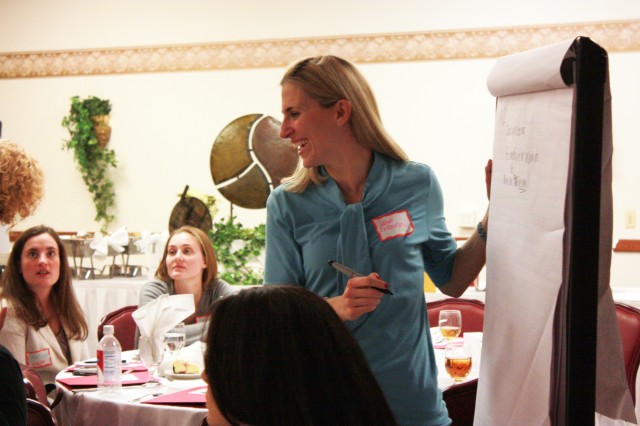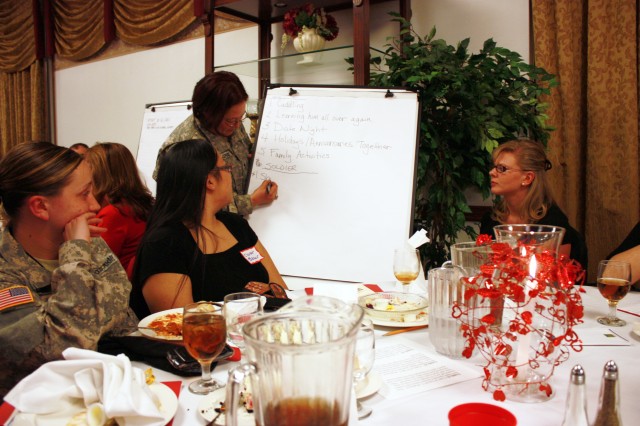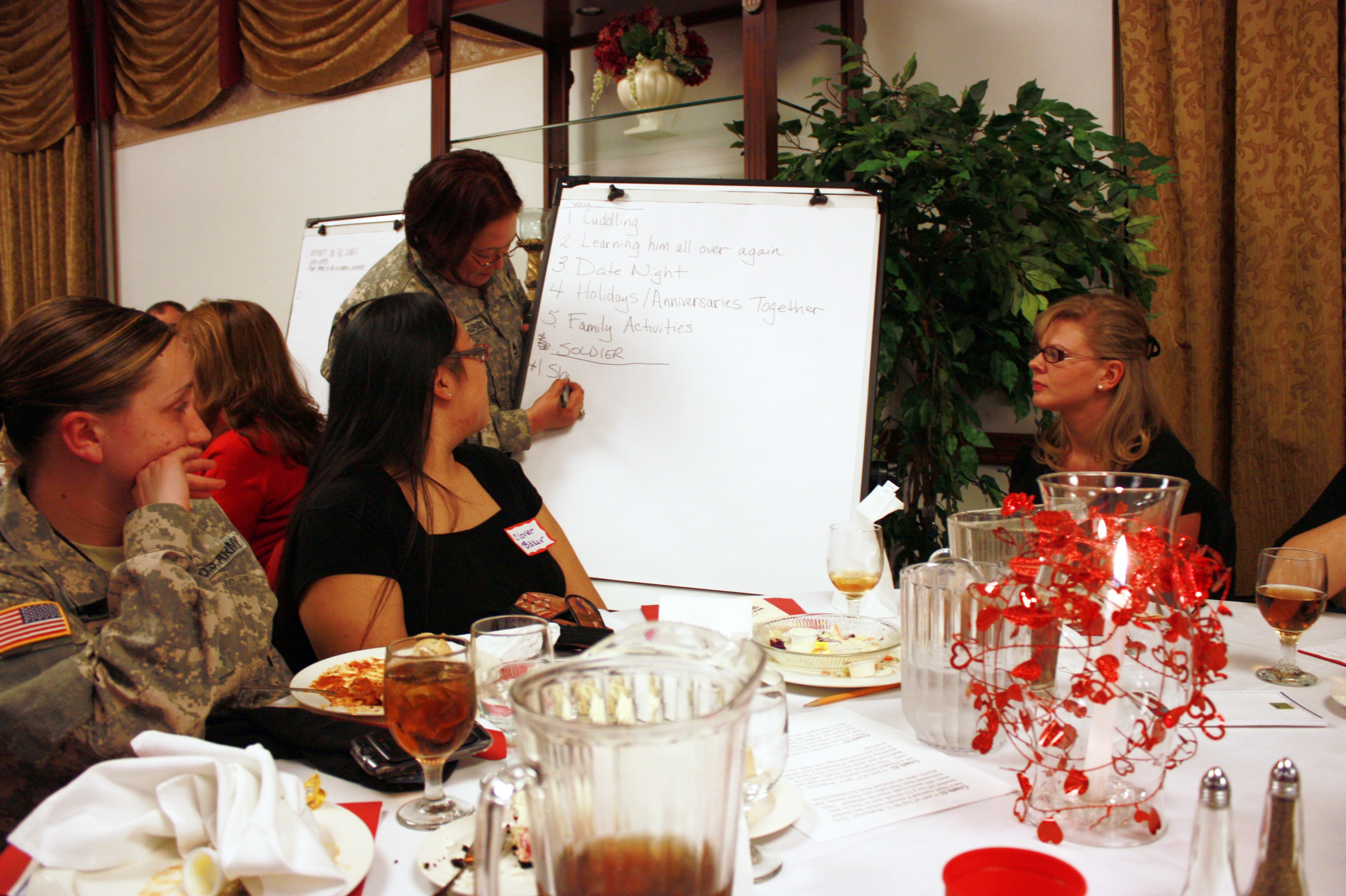FORT CARSON, Colo. -- A new and innovative workshop took place at Fort Carson's Elkhorn Conference Center to help the spouses of deployed Soldiers cope with numerous stressors. It was all thanks to a trip to a local bookstore and a spin-cycling class on Fort Carson.
Patty George, wife of Col. Randy George, commander, 4th Brigade Combat Team, 4th Infantry Division, was in a local bookstore when she came across a book titled "The Female Brain" by Dr. Louanne Brizendine. It deals with the difference in the brain chemistry between men and women.
When George read it, she came up with the idea to use this as the basis for working with spouses of deployed Soldiers.
In a spin-cycling class later that week, she ran into Lt. Col. Mary Krueger, 4th Inf. Div. surgeon. After discussing her idea, Krueger agreed to be the keynote speaker at the event. Approximately 200 spouses came to the workshop, featuring Krueger, the 4th Inf. Div. rock band High Altitude, three "mystery" couples, who answered questions from the spouses, and Nate and Jill Nugin from Army Community Service working as facilitators.
Krueger started the discussion focusing on the differences between the male and female brain. She spoke about various parts of the brain, including the amygdala, the instinctual core of the human brain that is part of the limbic system, which is involved in the processing and expression of emotions, especially anger and fear. The amygdala is smaller in women but Soldiers deployed in a combat situation have theirs running on overdrive. Because of this, when Soldiers return home from a deployment, they often have trouble readjusting.
"As far as the material I discussed," Kruger said, "my hope was that it normalized some of the reactions and thoughts ... spouses were having in regards to their upcoming reunions with their Soldiers. Especially for those experiencing prolonged separation for the first time, reintegration can be both exciting and scary.
"By explaining some of the normal reactions men and women can have during reunion, it can take some of the fear of the unknown away. Also by discussing it in a public forum, it can open up doors for spouses to discuss these expectations with one another, enhancing communication."
The spouses received tips on how to spot red flags, such as the Soldier fighting over small things, physical or mental abuse, or drug and excessive alcohol use. Krueger said these are signs of abnormal behavior that need immediate attention.
"It was really driven home ... that it's okay to go talk to the chain of command, or talk to the doctors, talk to the military family life consultants (and) ask for help if (they) feel like (their) Soldiers need it, even if he doesn't recognize it," said George.
During the workshop, spouses got the chance to interact with each other, come up with solutions and ideas, and ask any questions about what to expect when their Soldier return. The spouses also asked questions to three military couples who were behind partitions, out of view of the attendees. George said she did this so the spouses and the couples did not feel pressure while asking personal questions.
For many spouses, it was their first time facing a deployment. For others, it was as high as their sixth one. This diversity in the room allowed for a number of different thoughts and ideas on dealing with the emotional stress involved, and even the physical, such as spouses having to mow the lawn, or change the oil in their cars, something often previously done by their deployed Soldier. The workshop maintained a high level of fun and excitement throughout, something George said she planned from the beginning.
"We wanted it to be a little bit fun ... a little different," she said. "We were really trying very hard to get our information across in a different way so that it was a little bit more exciting for everybody."
The participants were constantly encouraged to remain interactive throughout the more than two-hour event. They received encouragement to express a number of thoughts, such as what they look forward to upon their Soldier's return, what the Soldier looks forward to upon his or her return, and even what children and extended family members went through prior to, during and after the Soldier's deployment.
The workshop managed to deal with these and many other scenarios, helping lead the spouses through ways of coping, not only helping themselves, but helping their Soldier reintegrate as well.
The program also covered what George called the different seasons in a relationship, summer coming first, the hot and heavy time when couples first meet. She said this is followed by fall or winter, a cooling off period many couples face. But, George noted, this does not have to be a time of pain, and can be cherished as a comfortable period as one grows into the relationship. George also pointed out that after every winter, spring always follows, a reference to a better time in the future for spouses.
Through presentations like Krueger's, the workshop also showed that while differences between the male and female brain are predisposed, the answers and ideas coming from the spouses showed each person is an individual, and has his or her own way of dealing with a stressful situation. This is something George said she considered ahead of time, and the workshop was designed to help facilitate the different ways people react to situations.
"We have a mission when they're deployed, and our mission is to stay strong," said George. "That doesn't mean that we don't have problems, but (we need to) know we can get help. The rear detachment is with us, the chain of command can support us, our family readiness group can help us to get through those things, but we do have to be strong for the deployment, so our Soldier can be 100-percent focused."
George also wanted spouses and Family members to be aware of the additional reintegration, reunion seminars and information available to them as a unit prepares to come home. Families can check out the calendar under the redeployment button on the brigade and battalion Web sites by going to http://www.armyfrg.org. They can also call Becky Mullins at 503-4005 and she will connect them to their respective Family Readiness Group. George said Family Readiness Groups are a great communication avenue for Families to stay accurately informed about unit and community events and activities, and are a great resource to accurately answer questions and address concerns. She said all it takes is one phone call, one e-mail or one visit for Families to connect.




Social Sharing